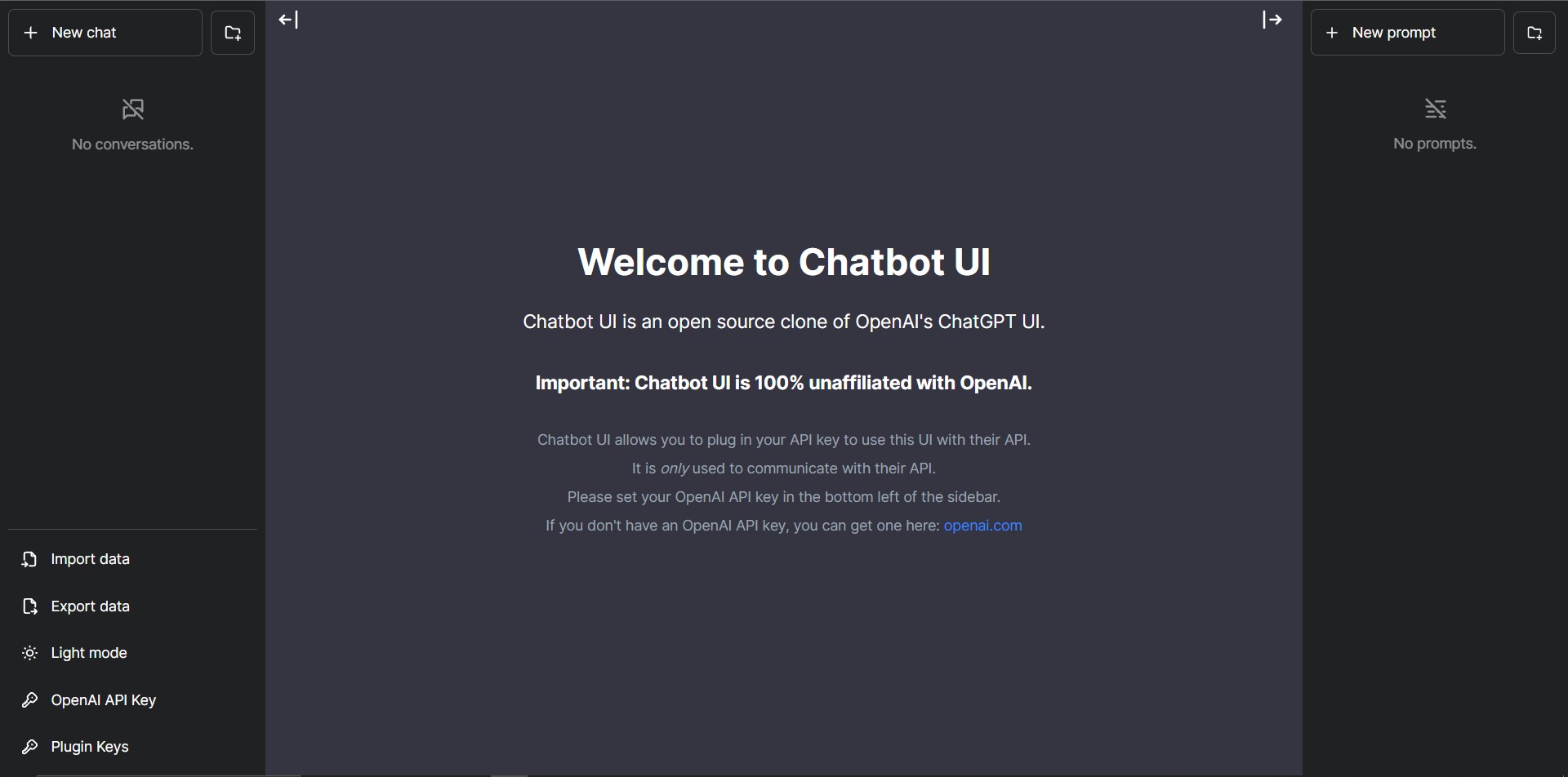Chatbot UI is an open source chat UI for AI models.
See a demo.
Chatbot UI will be updated over time.
Expect frequent improvements.
Next up:
- Sharing
- "Bots"
Vercel
Host your own live version of Chatbot UI with Vercel.
Docker Compose
Production (http://localhost:3000):
docker-compose -f docker-compose.yml --env-file .env.local up -dDevelopment (http://localhost:3001 & http://localhost:5984/_utils):
docker-compose -f docker-compose.dev.yml --env-file .env.local up --buildDocker
Build locally:
docker build -t chatgpt-ui .
docker run -e OPENAI_API_KEY=xxxxxxxx -p 3000:3000 chatgpt-uiPull from ghcr:
docker run -e OPENAI_API_KEY=xxxxxxxx -p 3000:3000 ghcr.io/mckaywrigley/chatbot-ui:main
1. Clone Repo
git clone https://github.com/mckaywrigley/chatbot-ui.git2. Install Dependencies
npm i3. Provide OpenAI API Key
Create a .env.local file in the root of the repo with your OpenAI API Key:
OPENAI_API_KEY=YOUR_KEYYou can set
OPENAI_API_HOSTwhere access to the official OpenAI host is restricted or unavailable, allowing users to configure an alternative host for their specific needs.
Additionally, if you have multiple OpenAI Organizations, you can set
OPENAI_ORGANIZATIONto specify one.
4. Run App
npm run dev5. Use It
You should be able to start chatting.
When deploying the application, the following environment variables can be set:
| Environment Variable | Default value | Description |
|---|---|---|
| OPENAI_API_KEY | The default API key used for authentication with OpenAI | |
| OPENAI_API_HOST | https://api.openai.com |
The base url, for Azure use https://<endpoint>.openai.azure.com |
| OPENAI_API_TYPE | openai |
The API type, options are openai or azure |
| OPENAI_API_VERSION | 2023-03-15-preview |
Only applicable for Azure OpenAI |
| OPENAI_ORGANIZATION | Your OpenAI organization ID | |
| DEFAULT_MODEL | gpt-3.5-turbo (OpenAI) gpt-35-turbo (Azure) |
The default model to use on new conversations |
| NEXT_PUBLIC_DEFAULT_SYSTEM_PROMPT | see here | The default system prompt to use on new conversations |
| NEXT_PUBLIC_DEFAULT_TEMPERATURE | 1 | The default temperature to use on new conversations |
| GOOGLE_API_KEY | See Custom Search JSON API documentation | |
| GOOGLE_CSE_ID | See Custom Search JSON API documentation | |
| NEXT_PUBLIC_NEXTAUTH_ENABLED | false |
Enable SSO authentication. set 'true' or 'false' |
| NEXTAUTH_EMAIL_PATTERN | The email regex pattern granted access to chatbot-ui | |
| NEXTAUTH_URL | http://localhost:3000 |
NextAuth Settings. See Official Document |
| NEXTAUTH_SECRET | NextAuth Settings. See Official Document | |
| GITHUB_CLIENT_ID | GitHub OAuth Client ID for NextAuth | |
| GITHUB_CLIENT_SECRET | GitHub OAuth Client Secret for NextAuth | |
| GOOGLE_CLIENT_ID | Google OAuth Client ID for NextAuth | |
| GOOGLE_CLIENT_SECRET | Google OAuth Client Secret for NextAuth | |
| STORAGE_TYPE | local |
Options are local, couchdb, & rdbms |
| COUCHDB_HOST | http://couchdb |
The hostname of the CouchDB instance |
| COUCHDB_PORT | 5984 |
The port of the CouchDB instance |
| COUCHDB_USERNAME | admin |
The username of the CouchDB instance |
| COUCHDB_PASSWORD | password |
The password of the CouchDB instance |
| COUCHDB_DATABASE | chatbot |
The database name of the CouchDB instance |
| RDBMS_DB_TYPE | postgres |
The database type of the RDBMS instance |
| RDBMS_HOST | 127.0.0.1 |
The hostname of the RDBMS instance |
| RDBMS_PORT | 5432 |
The port of the RDBMS instance |
| RDBMS_DB | postgres |
The database name of the RDBMS instance |
| RDBMS_USER | postgres |
The username of the RDBMS instance |
| RDBMS_PASS | password |
The password of the RDBMS instance |
| RDBMS_SYNCHRONIZE | true |
Whether to create tables from entities. Should be false in production. |
| RDBMS_SSL_ENABLED | false |
Whether to require SSL to connect to the database. |
| RDBMS_SSL_HOST | The hostname of the database server you are connecting to. Google Cloud may require this. | |
| RDBMS_SSL_CA | The Server CA certificate used for SSL connections, in the form of a single line string. | |
| RDBMS_SSL_CERT | The Client certificate used for SSL connections, in the form of a single line string. | |
| RDBMS_SSL_KEY | The Client certificate key used for SSL connections, in the form of a single line string. | |
| RDBMS_COCKROACHDB_TIME_TRAVEL_QUERIES | false |
Wether to user time travel queries features in CockroachDB |
If you do not provide an OpenAI API key with OPENAI_API_KEY, users will have to provide their own key.
If you don't have an OpenAI API key, you can get one here.
If you opt to use a relational database, you must also install the corresponding database driver. See the corresponding drivers here.
If you have any questions, feel free to reach out to Mckay on Twitter.
